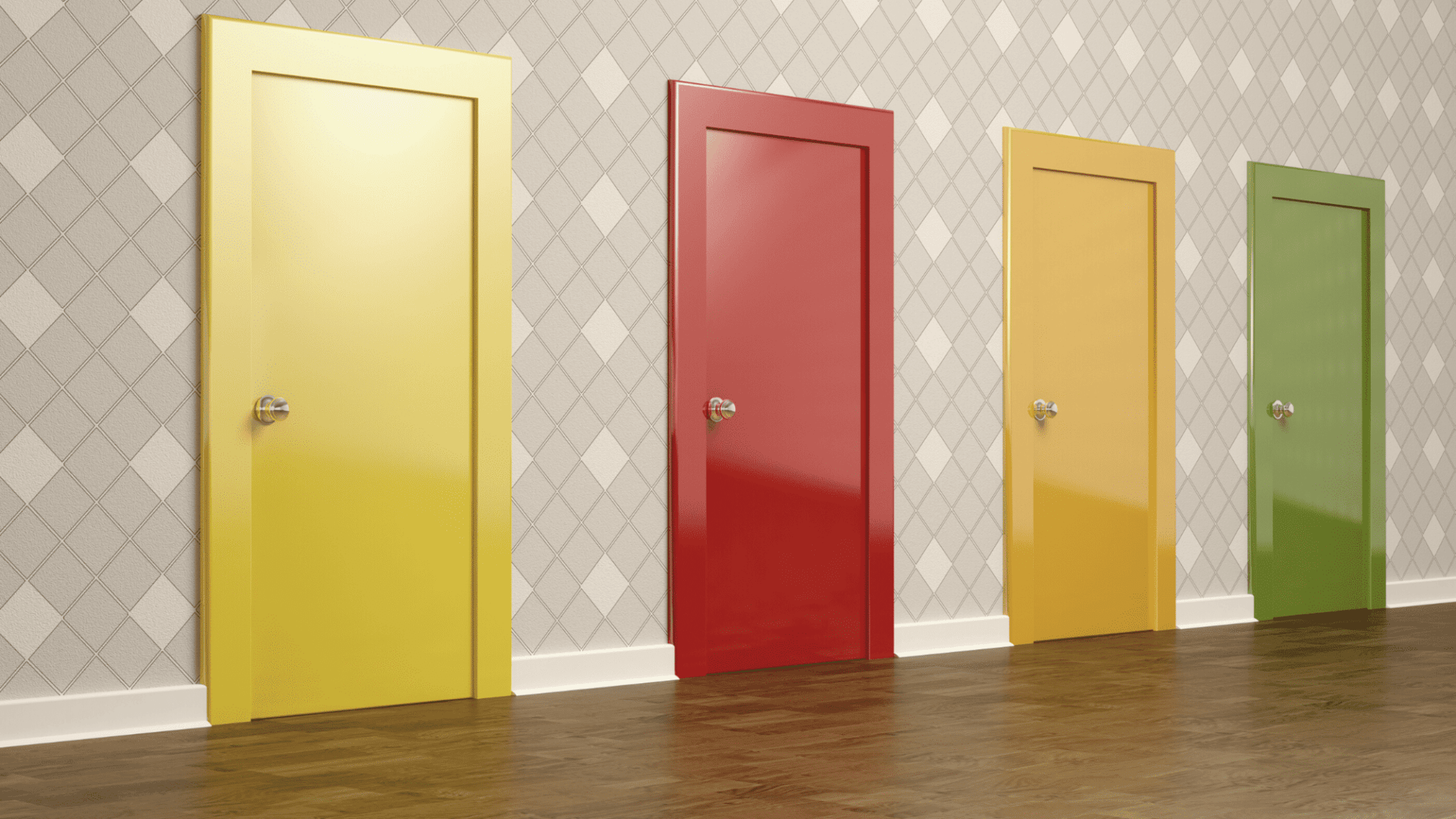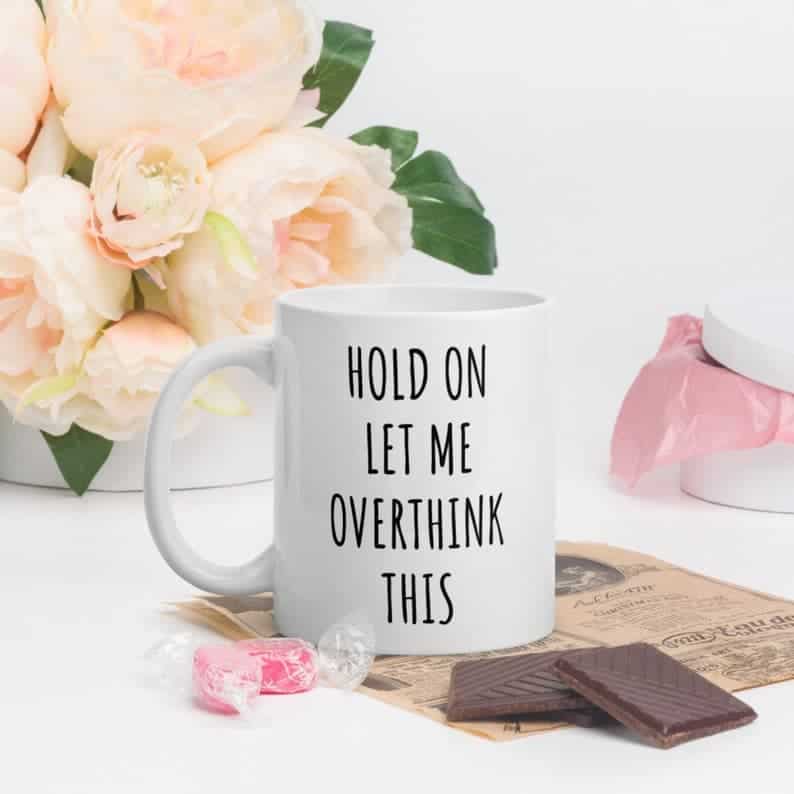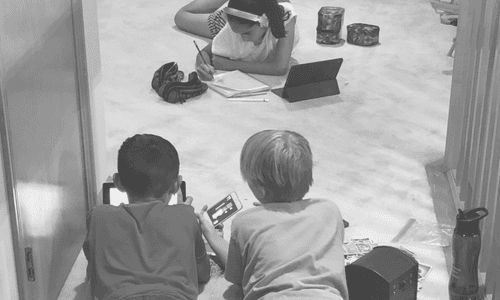Ways To Stop Overthinking And Make A Decision

We make an overwhelming number of decisions every day, and those decisions are harder because we have so many options. Understanding what influences our decisions and using a science-backed 7-step process will give you ways to stop overthinking and make a decision, giving you more peace of mind and less regret.
This post contains affiliate links – we earn a small commission if you purchase through our links, and we appreciate the support.
So Many Choices
When my husband and I walked into the store to do our first baby registry in 2006, I felt like the aisles were ten feet tall and closing in on me. He was even more overwhelmed. There were so many choices. For everything…car seats, strollers, sippy cups, bibs, and on and on. It was paralyzing.
That was such a pivotal moment in my realization of how many choices we have–especially because it was such a stark contrast to the number of choices given to our son’s foster mother in Guatemala (more about that journey here). It felt excessive.
And it’s everywhere:
- Starbucks offers over 80,000 drink options
- There are over 4,000 colleges and universities in the US and over 300 majors with endless specializations and minors. Is it any wonder parents and kids feel so much stress about college? This expert advice should help you relax a little.
- AllRecipes has 16,750 recipes for “the best chocolate chip cookie.” Do yourself a favor and use your grandma’s recipe. Unless your grandma got her recipe from a Nestle Tollhouse bag like Phoebe’s, then just use that.
- An average grocery store carries 175 varieties of salad dressings.
- Gray paint. Need I say more? I painted our living room gray a few years ago and I think I had at least 8 different samples. I looked at them in different light, I put them on different walls, I asked for opinions. And I still chose one that isn’t exactly right. The Behr website has 5 different shades of paint for red-toned grays, 5 shades for orange-toned grays, and so on through the whole rainbow.
- This article describes 28 styles of jeans for women, and doesn’t even include different washes or colors.
We have TOO MANY CHOICES which leads to overthinking. There ARE ways to stop overthinking.
I have found a way to minimize the number of choices I have in several areas of my life, and I honestly cannot overemphasize the freedom that has come with it. These have helped lots of moms, so we shared them all on our Free Resources page.
How So Many Choices Can Lead to Overthinking
Remember when we were kids and we went to school in the district where we lived and played sports with the same kids for years because we all went to school together? We went to the pediatrician and dentist in our town, and had two photographer options for senior pictures.
I feel really uncertain about school and activity options for my tween and teen boys. What does the future hold for them during and after this pandemic? How do we find ways to stop overthinking and make a decision for our family and feel okay about what we decide?

And even before the pandemic: Do we stay at the STEM school or go back to the public middle school? Will it be difficult to manage if one chooses STEM and the other stays in our district? Should we play sports at the middle school, on a rec team, on level X of travel sports or level Y? What can we afford? If they don’t want to do sports, what other options should we consider…guitar lessons, horse riding, coding?
Yes, there’s a lot to be said for so many options, but a consequence is overthinking, paralysis and more disappointment. There’s even an argument to be made for the connection between too many choices and our growing epidemic of anxiety and depression.
Before I go any further, I want to take a minute to acknowledge that all of these choices are a result of privilege.
The vast majority of people living on our planet don’t have the benefit of options, something that became painfully clear to me in that baby store. But excess is also a problem, albeit one of our own making. We’ve created a culture of overthinking and now we’re trying to figure out ways to stop overthinking and just make a decision.
Barry Schwartz is the author of The Paradox of Choice: Why More is Less.

He addresses the problem in his TED talk
“So the stuff I’m talking about is the peculiar problem of modern, affluent, Western societies. What I’m telling you is that these expensive, complicated choices — it’s not simply that they don’t help. They actually hurt. They actually make us worse off…The more options there are, the easier it is to regret anything at all that is disappointing about the option that you chose.”
What Influences Our Decisions
We know we’ve got a million options for practically everything, so what do we actually consider when making a decision? Psychologists explain that how we make a decision is influenced by reason, emotions, memories and bias.
Think about a big decision you’re trying to make right now, or one you’ve recently made. You can probably see the influence of all these. My dad passed away from dementia, but my brother and I had some major decisions to make when his health was rapidly declining:
Reason: He was living alone over 2 hours away from me. He was forgetting his medicine and was experiencing paranoia and psychosis. He needed care beyond our daily phone calls and periodic visits from friends. If we didn’t figure out how to do something soon, he would end up hurting himself. He’s my dad and I need to take care of him.
Emotion: It was awful to watch his decline. I felt guilty that I lived so far away, and also guilty for the time his care and the decision-making was taking away from my family and my job. I was exhausted by the daily phone calls, trying to sort between fact and fiction. He regularly told me that I wasn’t helpful, wasn’t doing enough, didn’t care about him, etc. I was stressed, anxious, hurt and frustrated nearly every day.
Memories: I’ve had a difficult relationship with him for most of my life. I knew that any decision I made would be the wrong one in his mind. No matter what I did, it wouldn’t make him happy.
Bias: More on that in a minute.
When we finally figured out ways to stop overthinking it, we were able to make a decision we could live with. Ultimately, we were able to get him into a nursing home that accepted Medicaid (that’s a whole other post sometime…) and had a separate locked wing for dementia patients. Reason carried this decision-making process for sure. I had to set aside the memories and push through the emotions to do the right thing. I feel like we made the best decisions we could, and we honor him as our dad and the person he wanted to be, even when that was hard to do.
Bias – That Sneaky Pitfall
Personal bias can lead to a bad decision. I talk about this with my college students because it’s important to recognize.
Nobody wants to make a bad decision! That’s actually one of the other problems when we look at decision-making–people are afraid of making the wrong decision. We don’t want to fail and we don’t like to make mistakes.
That’s a crazy amount of pressure, especially when we’re making a really important decision. It’s no wonder we struggle with overthinking! Being aware of our biases can be incredibly helpful. But I’ll warn you…acknowledging your bias isn’t easy and it can be pretty uncomfortable to admit.
It’s still worth it. Remember, we want to know ways to stop overthinking and make the best decisions, right? So let’s take a look at what might get in the way.
Anchoring Bias
We tend to anchor decisions around the first piece of information received, regardless of the accuracy of this information. It might be that get blinded by first impressions, whether those are about people or ideas or prices. We compare what we encountered first and make a decision by measuring everything else against it.
When does it happen? Let’s say you’re paying for braces (and here I thought the most expensive stuff was gone after daycare costs. Ha!). You get an estimate from one orthodontist that’s $5500, so when you hear $5000 at another office, you jump on it because it’s less expensive. You don’t bother to look further because this must be a deal!
Framing Effect Bias
Our decisions are greatly impacted by the way things are presented to us.
Allstate ran a commercial a few years ago that I loved. A teen comes into his parents’ bedroom to admit to a minor fender bender. He presents it as a “life lesson,” saying he already called the insurance company and learned they have accident forgiveness. He tells his parents how smart they are for having such great coverage. They cut him off mid-sentence to tell him he’s lost car privileges for four weeks. He says “ok,” turns and runs from the bedroom.?
When does it happen? If a few other moms in your inner circle decide they don’t like a certain middle or high school teacher, you may find yourself starting to make decisions based on the negative image created by the group. This happens even if you hear many positive opinions from moms who aren’t your close friends.
Loss Aversion Bias
Let’s shorten this one to FOMO – fear of missing out. We focus on what we might lose rather than what we might gain. The negative emotion (often fear) is a stronger motivator than a positive one, and it’s one of the reasons people are afraid of change.
When does it happen? We’re happy to find $20 but twice as upset to lose $20. Some friends invite you out for drinks and you go, even though you’re exhausted and have an early morning meeting. You don’t get together with them very often and you don’t want to miss a chance to connect. That motivates you more than knowing how much better you’ll feel in the morning if you get a good night’s sleep.
Ambiguity Bias
This is a fancy way of saying people can just be averse to risk and afraid of the unknown, and our decisions reflect this.
When does it happen? Sending your child to a week-long camp or on a mission trip to a foreign country might align with your family values but still make you nervous enough that you decide not to allow it.
Selective Perception Bias
We make decisions based on our own experience and how we see the world, and we tend to pay attention to things that we already believe.
When does it happen? I was always convinced that my mom liked my brother more than me. I know it’s not true and we joke about it, but it’s still apparently buried underneath somewhere. She shared a password with me recently and I immediately assumed it was all related to my brother. The information was actually a combination with both of us in mind, but I couldn’t see it. Even though I’m in my 40s.
A 7-Step Process: Ways to Stop Overthinking And Make a Decision
Most science-backed models for making decisions suggest 7 steps:
1. Clarify the Decision: This seems like an obvious and easy step, but it really is something you need to stop and do. Think about who else is affected, and make sure everyone is on the same page before you go any further.
2. Gather Information: Figure out what you need to know. Identify people who can provide insight and accurate information. Do an honest evaluation of reason, emotion, memories and bias. Be aware of how each one influences you.
3. Identify Alternatives: What are your options? Don’t limit yourself here–be sure to explore all possibilities.
4. Weigh the Evidence: When my boys were still babies, my husband and I decided to be very clear about our family values–our top priorities, what mattered most to us. We identified 5 values and every major decision was filtered through these values: faith, family, education, service and travel. It was life-changing and it simplified things more than anything I’ve ever done. I talk about it in more detail in this post.
Now that our boys are tweens and teens, we decided to get their input so we could factor that in to future decisions. It was a really interesting discussion, and we’re all really happy with our final list: adventure, communication, downtime, faith, service and family traditions. Using our values to weigh the evidence always gives us clarity.
5. Choose Among Alternatives: Now it’s time to actually make your decision. Put your options in order and choose the best one. These are ways to stop overthinking–if you follow the steps, you’ll have more confidence.
I got this advice from a professor: Make the best decision you can with the information you have at the time. It seemed like a silly statement at first, but I’ve come back to it frequently in the years since. There’s so much freedom in realizing there’s no perfect decision and there’s no way to know all possible outcomes.
6. Take Action: Do what you decided to do.
7. Review Your Decision: Most of us are either guilty of skipping this step or spending way too much time on it. Reflecting on our decisions is important because it means we’ll do better the next time–Mary explains how it helped her in this post. It’s just as important that we not camp out here either. All those “what ifs” and regrets can become debilitating and prevent us from really enjoying the life we have.
Like this blog post? We’d love to have you follow us on Pinterest and pin it for later!









The queen of over thinking here! These steps don’t seem to far fetched!! Thank you!